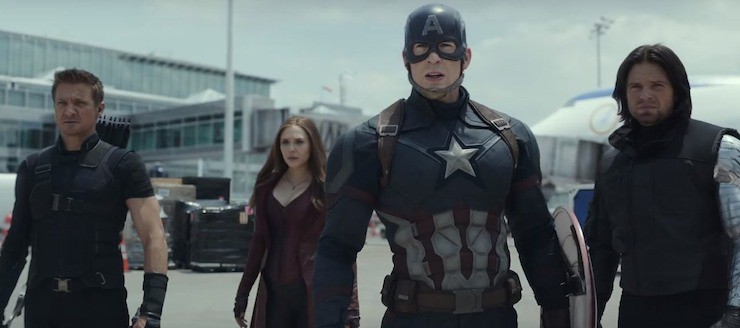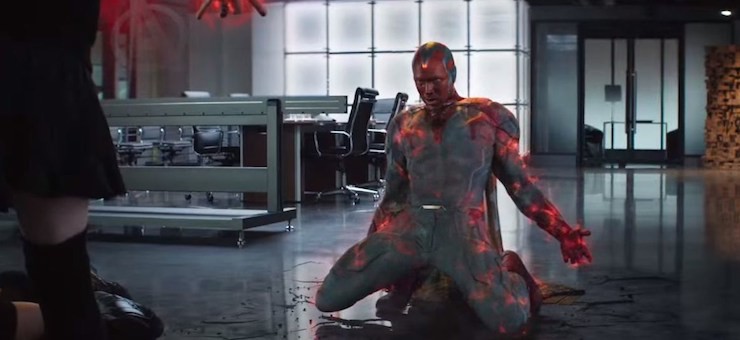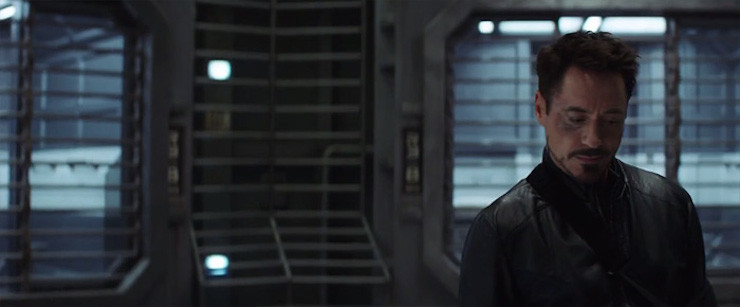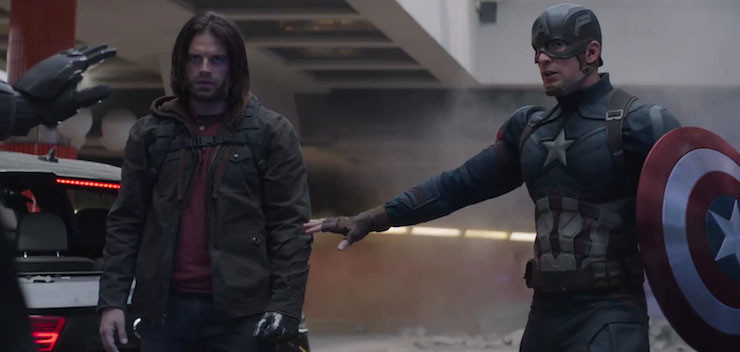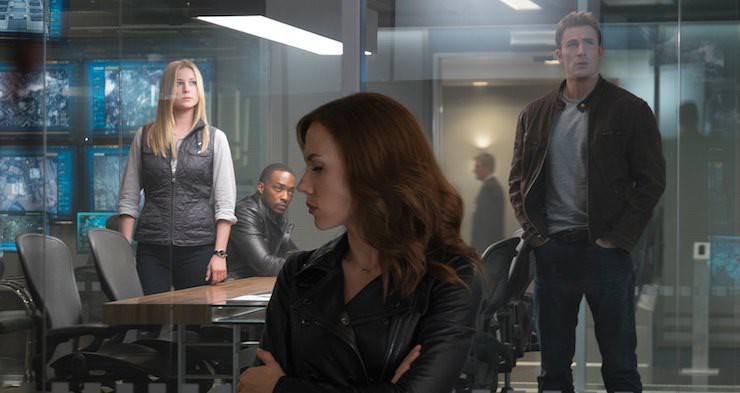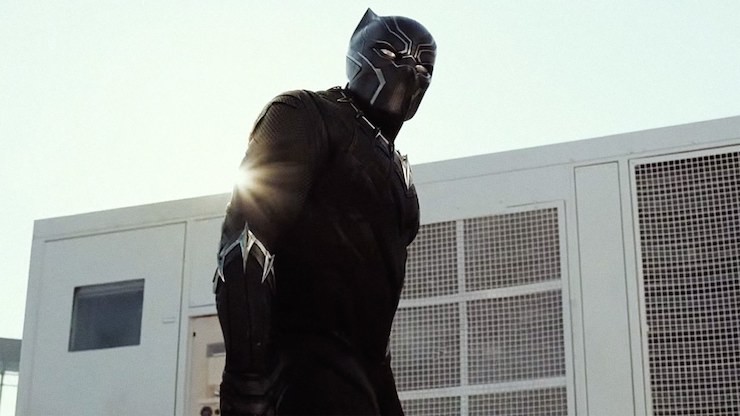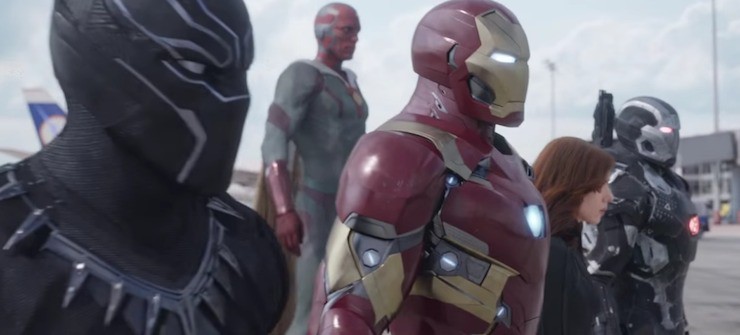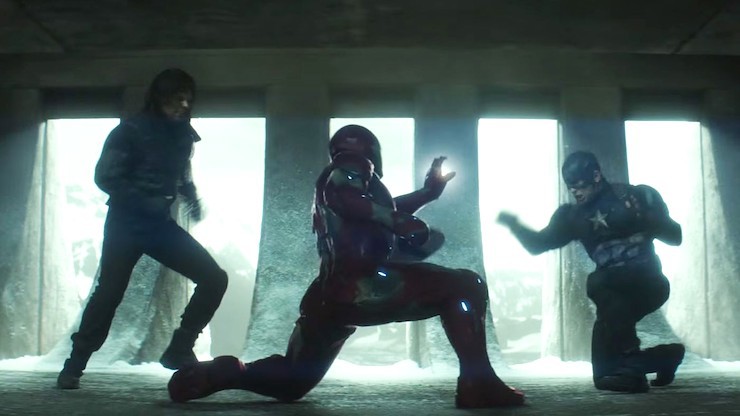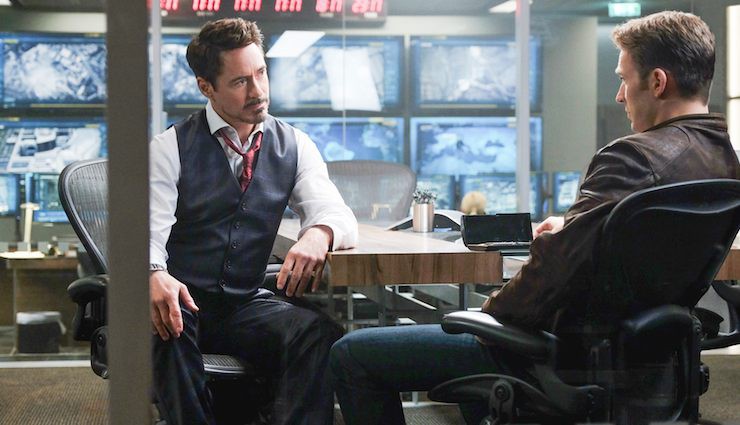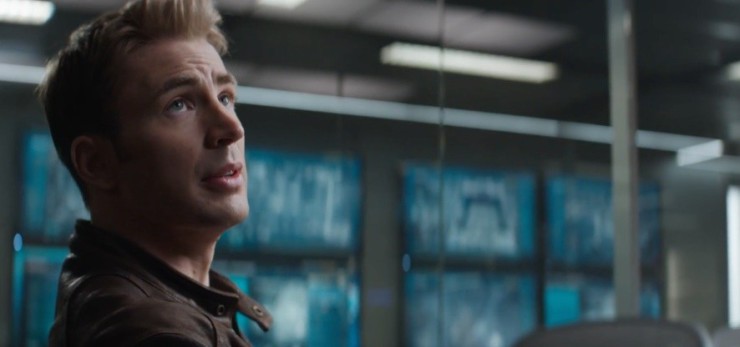One of the biggest problems with superhero team-up movies is making sure that they don’t feel like a paint-by-numbers action kaboom where the only benefit is familiar characters. And the main way to make sure that doesn’t happen is to make said familiar characters emotionally invested in the current conflict’s outcome, beyond the whole we-must-win-the-day schtick.
What I’m saying is, this movie should really be titled Captain America: HELP WE ARE ALL FULL OF FEELINGS. And that’s a very good thing.
Spoilers for the whole film below.
It’s frankly astounding that any film can contain so many separate, distinct character arcs, and still come out clean. That said, Civil War doesn’t quite feel like a single story, more a series of vignettes interspersed with some very imaginative action sequences. That’s not to say that the film lacks cohesion, only that any film with this many main characters usually ends up with a slight Love Actually vibe. (I just compared a Marvel movie to Love Actually. Apparently, anything is possible in this bizarre universe we live in.)
For those who are familiar with the comics, the narrative of the movie might come as something of a surprise. Rather than a Registration Act that requires superheroes to give up their secret identities (something of a redundancy in the MCU when so many of them don’t bother), the government regulation that our heroes are asked to consider is at the behest of the United Nations, who would like control of when and how the Avengers are deployed. Tony thinks this is a good idea, Steve does not. Then Peggy Carter passes away, and her niece Sharon shares a quote from her aunt at the funeral—one that advises a young Sharon to compromise until she cannot, and then stand firm and make the world bend to her. Needless to say, Steve takes that advice to heart.
Joss Whedon had initially said that he wanted the second Avengers film to be a deeply personal affair, and many comics fans assumed that he was going to tackle the Civil War arc as a result. Instead, we got Age of Ultron, which was enjoyable in some aspects, a bit of a mess in others, and not anywhere near as personal as we might have expected. Now we have Captain America: Civil War, a film in which every single character decision is deeply personal, deeply emotional. What’s impressive about the undertaking is how everyone’s points of view are entertained, and while there might be certain characters you agree with overall, no one is depicted as entirely unsympathetic or even entirely wrong. It’s an inevitable step between a team full of vastly opposing personalities, but a painful one.
At the core of this fight are Captain America and Iron Man, and deciding whose “team” you’re on is a far woollier choice than audiences might have expected. It’s easy to blame Tony Stark for these proceedings because Tony is egotistical and arrogant, even when he means well, and that makes him appear at fault more often than not. But the film is good at showing the places where Steve Rogers is uniquely unbendable, places where he could compromise and chooses not to, places where his righteousness is less appealing. The truth of the matter is that Steve doesn’t want the Avengers under UN control because Steve Rogers doesn’t trust anyone. In response to idea of these Sokovia Accords, he feels obligated to point out that every member, every country has their own agenda. Which is a fair point, but fails to include the fact that all people generally do, himself included. Captain America doesn’t really trust the will of the people—he thinks it’s far safer for the Avengers to use their own judgment on what missions they take. This is in keeping with Steve’s development in the MCU, particularly as it pertains to Winter Soldier; when he tried to put his trust in the system, it turned out that Hydra was behind that system all along.
On the other side of this we have Tony Stark, who, despite being overly-insistent that all problems are his problems, is mainly desperate to keep his friends safe. That is his primary motivation throughout the entire process, a motivation that makes more sense when we learn that his relationship with Pepper Potts hasn’t been working out. (On the one hand, I’m hardly surprised given his recent activities, on the other hand NO YOU TAKE IT BACK.) These are the only people that Tony Stark has in the whole world, but he doesn’t know how to get that across. Or rather, he chooses not to get that across because most of his personal relationships end in abnegation, death, or, you know, attempted murder (thanks, Obadiah!). To his credit, these are problems that he is clearly trying to work through at the outset; we discover that Tony has developed an immersive virtual reality therapy app of sorts, one that allows people to reach into their memories and relive traumatic events with better outcomes to receive closure. He shows an entire room of students his final memory of his parents, and manages to tell his father that he loves him before Howard and Maria drive to their deaths.
Both Tony and Steve have viable reasons for thinking that they’re doing the right thing. Both of them make serious errors in judgment as a result: Tony puts Wanda under house arrest, and Steve causes a fair share of collateral damage in effort to help Bucky escape capture. Both of them wish they could compromise their way out of this, but both of them have wildly different ideas about what compromise should entail. And then Bucky is hijacked, and Steve is useless for negotiations from that point forward—particularly once Bucky tells him that their current enemy Col. Helmut Zemo (Daniel Brühl) seems to be after the other five Winter Soldiers programmed by Hydra.
Steve Rogers’s fight with Hydra has been a fascinating sticking point for the character throughout these films. Because they turned out to be the power behind S.H.I.E.L.D., the protective organization that Howard Stark and Peggy Carter built, and also behind Bucky’s brainwashing into the Winter Soldier, Captain America’s stake in dismantling Hydra is personal beyond his role in fighting them during WWII. Bucky is most personal of all these offenses, Steve’s only living link to his past once Peggy is gone, his best friend throughout the majority of his life. Which makes it all the more interesting that even Bucky calls Steve on his devotion by the end of the film, positing that he’s not worth so much trouble. Of course, from a personal standpoint, Bucky is… but his comment could almost be read an in indictment of Steve’s unwillingness to take pause and think where his best friend is concerned.
From the springboard of Tony and Steve, we come to the other Avengers, who all have different stakes in this fight. Sam Wilson has been on board with helping Cap find his pal since day one, but having the Winter Soldier in the back of their getaway car turns out to be even less enjoyable than he imagined. (The prickly camaraderie that develops between Bucky and Sam is easily one of the highlights of the film.) Rhodey is on Tony’s side due less to their long friendship than to his respect for chain of command, every inch the respectable soldier—let’s be honest, regulation is everything he’s been asking for from Tony since Iron Man 2. Vision believes there is a correlation in the escalation of threats to the multitude of super peoples, and believes that oversight could only help. Hawkeye backs Steve because he’s never been Tony’s biggest fan in the first place, and nothing defines Clint Barton so well as being a perpetual underdog. Ant-Man joins Cap because he’s just jazzed to be there. (Also, Hank Pym isn’t exactly a fan of the Stark family.) Black Widow plays her cards close as always, but the truth is easy to discern in the few words she chooses to say: The Avengers have become her family. All she really wants is for that family to stay whole, even if it means being regulated. But once she realizes that Steve won’t be won over, she backs off, giving up on the hope that the conflict will be resolved easily.
The person in this film who feels most done wrong by is Wanda Maximoff, on both a real-world level and a storytelling level. She is badly treated once the conflict is underway because of her near-unlimited and dangerous powers, a treatment made worse for the fact that Vision—the one supervising her house arrest—appears to have a crush on her. On the one hand, Vision is young by existence standards, making it easy to read his attentions as boyish and harmless. On the other hand, it’s discomfiting that Wanda should be held at bay by someone harboring such feelings, and these attentions make Vision seem manipulative and controlling at the very least. She gets the last word, telling him that she cannot control the fear she instills in others, only her own fear. But it doesn’t change the fact that the movie seems at a loss for what to do with Wanda’s power, and that alone feels circumspect in a universe harboring figures like Thor and the Hulk.
In the midst of these characters that we know, we are gifted two new faces—T’Challa of Wakanda, and Peter Parker of Queens. Black Panther’s arrival to the MCU is a long time coming, and Chadwick Boseman plays him with incredible poise and grace. We get all of two minutes’ introduction to him and his father and the position of Wakanda in this world, and that’s really all we need to get invested (though we obviously want much more). Because T’Challa believes that Bucky is responsible for his father’s death, it seems as though we’re in for a standard revenge plot. Yet it is Black Panther alone who is able to put aside his all-consuming desire for vengeance, and step away before it is too late. It is a perfect introductory arc, in keeping with what comics fans know of T’Challa, a man known for his intelligence and consideration. It’s going to be hard to wait for that solo film now.
Our surprise package comes in the form of a brand new Spider-Man, which confused a fair share of viewers leading up to the film’s release, seeing as he was being played by Andrew Garfield only two years ago. But Tom Holland’s take on Parker is finally as young as Spider-Man was at his inception, a teenager being played by an actual teenager. (For the record, Peter is supposed to be fifteen years old, and Holland was seventeen when he was cast.) What’s more, this is the first version of Spider-Man who appears to come from a visibly lower class bracket; he lives in an old, crowded building in Queens, his room is cramped and awkwardly shaped, and nothing that he owns looks new. Holland’s awkwardness lends Peter an authenticity that audiences have never seen on screen; Spider-Man’s one-liners are more a product of nervousness than true wit. And Tony’s first meeting with the wonder kid makes it abundantly clear that they have a future as mentor and apprentice—not only is Tony the right guy to upgrade Peter’s equipment, but they have something key in common: they both chose to become superheroes due to an overpowering sense of guilt. (Peter tells Tony than when someone with his kind of powers chooses not to use them, people get hurt, an obvious reference to the death of Uncle Ben.)
The Avengers-on-Avengers remix battle is one of the most entertaining fight sequences that a Marvel movie has ever produced, and that’s mostly down to a sharp balance of levity and pain. This has a lot to do with the fact that very few of these people are personally angry with each other, and a few of them have no emotional investment in the fight whatsoever. Ant-Man merely does what’s asked of him, with no particular upset toward anyone who knocks him down a peg. Spider-Man is going on Tony’s orders, and only aims to capture, never to wound. Hawkeye and Widow are basically play-fighting, to the point where Wanda tosses Natasha out of the way because Clint was “pulling his punches.” For all the real fear bound up in this fight, there’s an equal amount of love that simply can’t be quashed.
That all comes to a close when Cap and Bucky get away on the Avenger’s jet, with War Machine and Falcon in pursuit. Tony orders Vision to take down Falcon, but he’s distracted by Wanda’s injuries and misses, hitting Rhodey instead and sending him into a free fall. Watching him hit the ground as Iron Man and Falcon struggle to reach him is sickening, and while Rhodey survives the fall, his immobilizing injuries make him the true casualty of this war. Ever the soldier, he later tells Tony that he stands by the choices that he made, that he has always known the risks of combat and continued to do his job. It’s an absolution of sorts, but not one that Tony Stark is likely to take to heart.
The final act comes when Tony receives the information he needs to confirm Cap’s story, proof that Bucky was not responsible for the UN bombing that killed T’Challa’s father. But the extra information that Steve and Bucky were going on proves to be a red herring; Zemo, an oddly silent villain through the tale’s proceedings, has killed off the remaining Winter Soldiers, and offers up something else instead—footage of a mission taken on by the Winter Soldier in 1991. Footage of James Buchanan Barnes murdering Tony’s parents. And when Tony asks the most important question of all—whether or not Steve knew Bucky had done this—Steve Rogers is not able to give his usually noble answer. Instead, he has to admit that he protected his friend, and has known all along.
All superhero villains tend to be more interesting when they have a real personal connection to the people they are trying to destroy. It’s the reason why Ronan and Ultron are ultimately less engaging than Loki and The Mandarin. In Zemo, we have someone who is not acting out of a desire for power or glory, but a man who simply wants to ruin the Avengers’ lives for ruining his. And in his strange wisdom, he knows precisely how to do it. He knows exactly what buttons to push. He knows that Tony Stark will want to kill Bucky Barnes for murdering his mother (not his parents, not his father, his mother), and he knows that Steve Rogers will never allow that to happen.
And while Tony’s revelation is immediate and horrific, it is Steve that we’re to watch. Because the movie isn’t called Iron Man: Civil War, is it? It’s not even called Avengers: Civil War. It’s got Captain America’s name on it because this movie is ultimately here to teach us something about him.
What we have—as we always did—is a beautifully unique rendition of a character who would have been easy to paint in a stale, dull hue. This version of Captain America postulates that the true way to be “the greatest” American is to be an individualist, albeit a truly empathetic one. Steve Rogers really isn’t much of a team player in a universal sense; he’s not a “good little soldier”; he’s only a good leader when backed by a crew that is well-suited to his particular way of doing things. He’s anti-establishment at a fundamental level, which is a refreshing thing to reinforce in a hero whose origins are bound up in nationalism. So he fights to rescue his best friend—who deserves a second chance—at the expense of every other relationship he has forged, because it’s the right thing to do. When Tony tells Steve that he doesn’t deserve the Captain America shield, Steve chooses to discard it, and this seems to work on two levels; first off, Tony has conflated the image of Captain America with the man Steve Rogers (which is to be expected, given how Howard built the man up to his son as a figure to emulate); secondly, Steve has no difficulty casting aside the symbol that is Captain America, particularly in that moment, if it means saving Bucky’s life. And this is central to everything that makes Steve the man who can wear that uniform in the first place—as the saying goes, no one who is capable of getting themselves elected president should be allowed to do the job.
Steve Rogers is Captain America because he doesn’t really want to be Captain America. With or without that shield, everyone will always know it.
And by the end of the film, Steve pointedly understands that as well. The letter he leaves Tony is half apology, half self-realization. He acknowledges that withholding information on the death of Tony’s parents was a selfish move on his part. He acknowledges that he has always been a man apart from others, and that in this capacity, the Avengers belong more to Tony than they ever have to him. But he also acknowledges that he cannot walk away from Tony Stark, or their friends. That he cannot leave the role of Captain America, he can only pause his portrayal of it. So he gathers their team and tells Tony that they will wait for his call.
Because Natasha was right, this is their family. A family that Steve Rogers is more than happy to safeguard—on his own terms.
Emmet Asher-Perrin had so much excess adrenaline after watching that movie, she probably could have stopped a moving car, too. You can bug her on Twitter and Tumblr, and read more of her work here and elsewhere.










